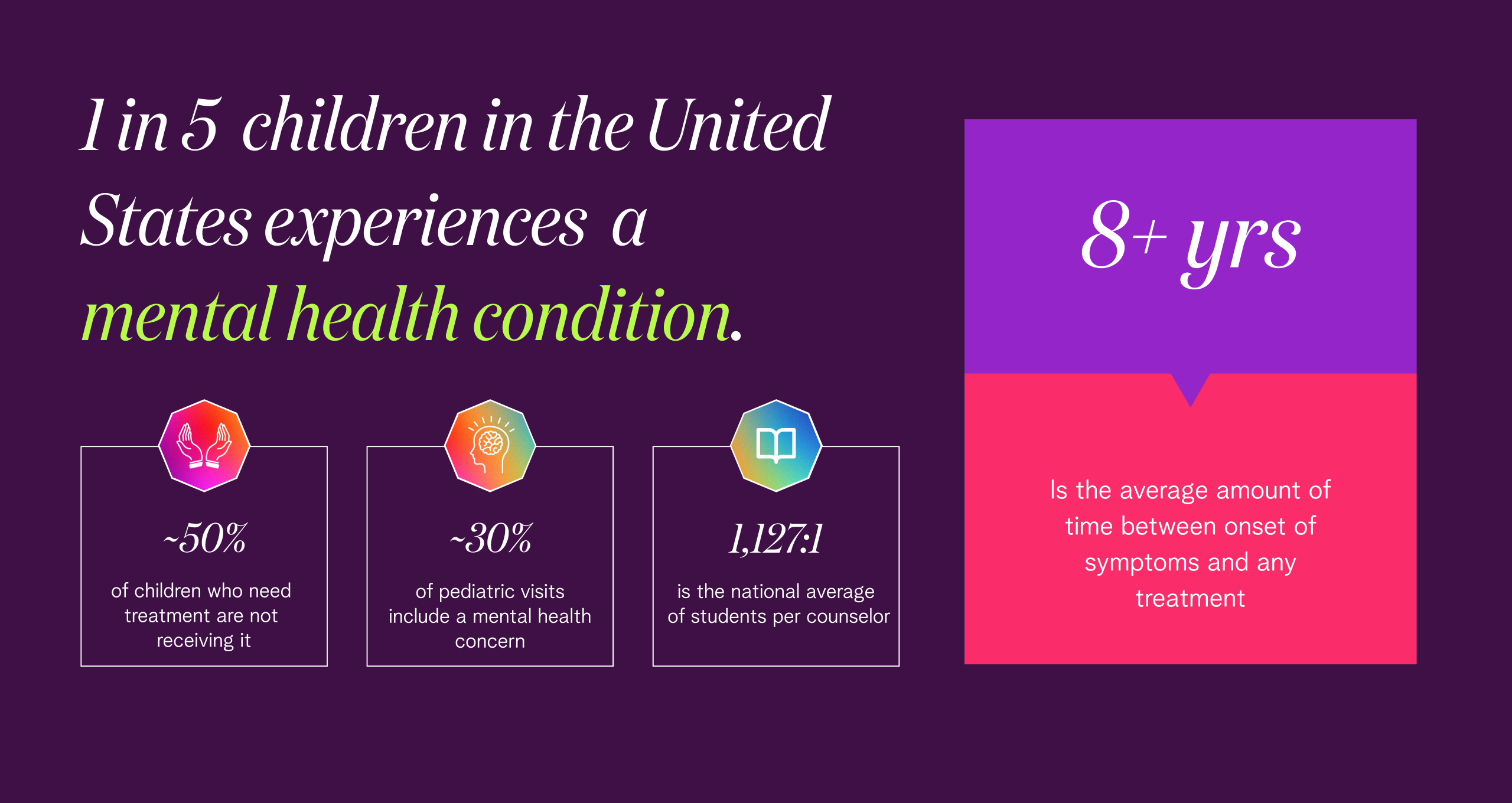
The Kids Aren’t Alright: Addressing the Adolescent Mental Health Crisis With Accessible, High Quality, Evidence-Based Practice
By: James Quarles, Venture Chair at Redesign Health
-
Imagine growing up today in a social media obsessed society, with increasing political and environmental volatility, and a global pandemic. These challenges are a backdrop to the natural insecurities that come with growing up — contributing to a generation more likely to report mental health concerns, including stress and depression. than any other age group.
Research shows that mental health disorders “have surpassed physical conditions as the most common causes of impairments and limitations in children.” Suicide was the second-leading cause of death among 10 to 14 year-olds in 2020, and most children and adolescents who attempt suicide have an underlying mental health disorder. And more often than not, those who could stand to benefit enormously from treatment aren’t getting it.
As a father of three, this issue hits incredibly close to home. Navigating a global pandemic and witnessing the unique challenges this generation is facing has sometimes left me feeling helpless. So as both a dad and as a Venture Chair at Redesign Health—where I help build companies with the mission of redesigning healthcare for everyone—I knew that it was critical to address the ongoing crisis in children’s mental health.

Understanding the problem
While awareness of this issue is relatively widespread, it’s not quite as clear why children and families face barriers when seeking mental health care. Our team set out to better understand the problem through research—ultimately identifying the need to partner with pediatricians, payers, educators and caregivers to redesign the mental health care system. We also learned that creating more readily available, commercially insured evidence-based care pathways is of critical importance.
Because adolescent mental health is an issue that impacts entire communities and requires commitment and involvement from all parties, our team sat down with therapists, pediatricians, school psychologists, guidance counselors, parents—and of course children and adolescents—to discover the biggest challenges they’re facing. This discovery process is a core part of the company creation cycle at Redesign Health.
Here’s what we found:
High prices and a lack of available expertise make mental health care increasingly difficult to access. The existing options for comprehensive mental health care for adolescents are often inadequate. School systems are frequently ill-equipped to effectively manage the number of students who need care. The national average of students per counselor is 1,127:1, more than 4x the ratio recommended by the American School Counselors Association.
And while school programs that encourage and track the social emotional learning (SEL) development of children and young adults hold a tremendous amount of promise, they’re not well (or widely) understood by parents today. If we tracked kids as closely on these social and emotional competencies as we do math and reading, I believe we'd have a completely different level of parental involvement and understanding.
In fact, up to 75% of behavioral health care starts in the primary care office — and pediatricians we’ve spoken with estimate that 40% of patients in their waiting rooms are facing mental health challenges. More often than not, they have nowhere to refer them to. Further, there’s sometimes a 8+ year gap between the onset of symptoms and actually seeing a therapist. When pediatricians do have somewhere to refer kids, the majority of those providers will be inaccessible either due to prohibitively high out-of-pocket costs, lack of virtual options, or because they’re not taking on new patients. Over a quarter of people who need to see a mental health professional use an out-of-network provider, compared to less than a tenth of people who need to see a medical specialist. For those select few taking on new patients, incredibly long wait lists are typical.
Social stigmas prevent many people, namely parents, from seeking care. While a lack of providers and high costs are common roadblocks, social stigmas around mental health care and a lack of education may also cause people — particularly parents — to doubt the efficacy of the system and treatments available today. There are various factors feeding into stigmatization, including cultural misunderstanding, but ultimately, this social barrier often results in a reluctance to seek care. Fortunately this trend is shifting for children, as seeking care becomes something younger people increasingly talk about and are open to.

"Up to 75% of behavioral health care starts in the primary care office — and pediatricians we’ve spoken with estimate that 40% of patients in their waiting rooms are facing mental health challenges." - James Quarles, Redesign Health
-
Equipping caregivers with the skills and tools to seek a diagnosis and proactively find care is critical to effectively addressing this crisis. Unfortunately, through no fault of their own, caregivers often don’t have the tools or knowledge to address the mental health-related needs of their children. No one gives you a manual to help navigate these challenges, and unfortunately, the mental health system often ignores the critical role that caregivers provide.
There’s no real standard as to what “normal” mental health looks like at a given age, so caregivers might be conflicted as to whether or not a child could benefit from professional help.
If a diagnosis is given, many parents and caregivers struggle with guilt. Some feel like they didn’t see it coming, and question if they could have done more to prevent things from escalating. We have a real opportunity to remove roadblocks to care and invest in preventive and proactive practices — thereby giving children and their parents the resources to have tough conversations and navigate their way to high-quality care. Building a solution that allows caregivers to play an active role in their children’s treatment is critical.
The pandemic exacerbated mental health challenges and has made this crisis more dire than ever before. Unsurprisingly, the COVID-19 lockdown and subsequent periods of extended time at home exacerbated children and adolescent’s mental health issues—and also made parents acutely more aware of them. Social interactions are critical to the development of children and adolescents, because it helps define a sense of self and provides a peer group to help navigate the complexities and challenges of growing up. In fact, a recent study shows a strong association between social isolation and anxiety and depression in children and adolescents, due to higher levels of cortisol and worse cognitive development.
Further, the additional challenges caused by the pandemic, including financial and housing insecurity, issues with virtual learning, grief for lost loved ones, etc. increased the risk of negative mental health impacts
According to a meta-analysis from 2021, global rates of anxiety and depression among adolescents doubled during the pandemic. Now, we’re left to pick up the pieces and try to forge a path forward — and it’s critical we do so now.

"We have a real opportunity to remove roadblocks to care and invest in preventive and proactive practices — thereby giving children and their parents the resources to have tough conversations and navigate their way to high-quality care." - James Quarles, Redesign Health
Launching a Meaningful Solution
That’s why I’m thrilled about the launch of Fort Health, a company built at Redesign Health that combines therapy for children and adolescents with training for parents and caregivers. Guided by research and data, Fort Health is a digital mental health clinic that bridges the gap between behavioral and primary care, connecting adolescents to in-network licensed providers and providing resources to support families and caregivers.
Fort Health offers fast access to affordable and evidence-based care through partnerships with:
Pediatricians: Fort Health enables pediatricians to make direct referrals, provides care coordination, and opens a door to families at the beginning of their mental health care journey.
Insurance plans: As an in-network virtual treatment platform, Fort Health partners with insurance providers to increase the affordability of mental health treatment.
The Child Mind Institute: Fort Health is built in partnership with the Child Mind Institute, a nonprofit dedicated to transforming the lives of children and families struggling with mental health and learning disorders. Leveraging their gold-standard evidence-based clinical experience, the Child Mind Institute has developed a proprietary clinical training program for use by Fort Health.
Parents and caregivers: With a family-centric approach to care, Fort Health addresses the logistical burden of coordinating care—from scheduling appointments to providing a channel for pediatricians and behavioral health specialists to communicate and view patient progress. Supplemental caregiver training resources are also available.
What truly differentiates Fort Health is the unrivaled, personalized care journeys they offer—and the expert-backed guidance they provide. Working with the leading independent nonprofit in children’s mental health, Child Mind Institute, a comprehensive training, evidence-based therapeutic protocols, and curricula has been developed for use by Fort Health. This collaboration is unique and a huge value-driver, and most importantly it will have a resounding positive impact on the services therapists are able to provide.
Fort Health is focused on combining therapy for children and adolescents with skills training for parents and caregivers to broaden access to quality and affordable mental health services. This holistic approach includes:
Partnering directly with pediatricians
Ensuring quick and easy access to quality care
Providing tailored care options, including individual treatment, group therapy and caregiver training
Training clinicians with evidence-based protocols and empowering caregivers with the tools they need to support their child’s care journey
Ensuring efficacy by measuring symptom reduction through clinically validated assessments, regular meetings with a therapist and a post-treatment report
Fort Health’s work is guided by several important clinical principles. Fort Health recognizes that no two families are the same, and that tailored care is critical to addressing mental health challenges. They fundamentally believe that accurate diagnoses are key to quality treatment. They know that empowered parents can be a valuable resource for their child and supercharge the effectiveness of the therapy process. And they understand the importance of maximizing each therapist’s clinical potential to provide the best care possible. Finally, they believe technology should empower therapists to focus on providing care and make it easy for families to access care how, when and where they need it.

-
I’m really excited about the dynamic team that will be leading the charge, including founder and CEO Natalie Schneider, a brilliant digital health executive with over two decades of experience in healthcare and technology, Carrie Rutstein, Fort Health’s COO who comes from Sanvello Health and brings two decades of experience working in healthcare, and Matthew Biel, MD, MSc, Fort Health’s CMO, who is Chief of the Division of Child and Adolescent Psychiatry at MedStar Georgetown University Hospital and a Professor of Clinical Psychiatry and Pediatrics at Georgetown University School of Medicine.
I also want to acknowledge the founding team of Lindsay Henderson, Shir Harel and Shai Idelson, who were instrumental in bringing Fort Health’s idea to life. They also have a fantastic group of advisors, including the active involvement of Harold S. Koplewicz, MD, President, and Mimi Corcoran, Executive Director of the Child Mind Institute, who bring their lifelong advocacy for adolescent mental health to Fort Health’s work.
While no single solution can tackle a problem as vast as global mental health, founders like Natalie and partners like the Child Mind Institute, who are building solutions like Fort Health, give me hope for the future outlook of this important issue. When it comes to young people’s mental health, we are stronger together.
Check out Fort Health’s website to learn more.
Disclaimer
If you are in crisis or are experiencing an emergency, call your doctor or 911 immediately. If you're having suicidal thoughts, call 1-800-273-TALK (8255) to talk to a skilled, trained counselor at a crisis center in your area at any time (National Suicide Prevention Lifeline). If you are located outside the United States, call your local emergency line immediately.

James Quarles has over 20 years of leadership experience at global technology companies. He was most recently CEO of Strava, the social network for athletes, where he doubled its subscriptions business and established it as one of the fastest growing sports brands of our time. Prior to Strava, James served as Vice President at Instagram during the hypergrowth of its community and brand. He built Instagram's own multi-billion dollar business by creating tools for discovery, advertising and shopping on the platform. Before Instagram, James served as Regional Director for Facebook Europe, opening new country offices and building strategic partnerships with the largest global brands. Prior to Facebook, James worked at Dell as General Manager for the public sector and in multiple marketing leadership roles. James has been named one of the “50 Most Indispensable Executives in Marketing, Media and Tech” by AdWeek and served as an advisor to Freeformers and BiggaFish, two organizations developing the digital skills of underserved youth in the UK. James holds an M.B.A. from the Kellogg School of Management at Northwestern University and a B.S. in Mechanical Engineering from the University of Virginia.